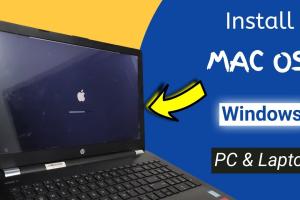Ultimate Guide: How to Install macOS on a Windows PC Easily

-
Quick Links:
- Introduction
- Requirements
- Choosing the Right Version of macOS
- Creating a Bootable USB Drive
- Configuring BIOS Settings
- Installing macOS on Your Windows PC
- Post Installation Steps
- Troubleshooting Common Issues
- Case Study: Successful Installations
- FAQs
Introduction
With the growing popularity of macOS, many Windows users are eager to experience the macOS environment without investing in new hardware. Installing macOS on a Windows PC is a feasible option, commonly referred to as creating a "Hackintosh." This guide provides a detailed, step-by-step process for installing macOS on your Windows PC, offering insights, tips, and troubleshooting methods for a smoother experience.
Requirements
Before you begin the installation process, ensure that you have the following:
- A compatible PC: A computer with Intel processors is recommended.
- 8GB USB drive: This will be used to create a bootable macOS installer.
- macOS image file: You can download this from the App Store on a Mac or find a legitimate source online.
- Windows PC: A functioning Windows operating system for the installation process.
- Bootloader: Software like Clover or OpenCore is required for booting macOS.
Choosing the Right Version of macOS
Choosing the right version of macOS is crucial for compatibility and performance. The latest versions may have better features, but older versions can sometimes be more stable on non-Apple hardware. Research compatibility with your hardware before downloading.
Creating a Bootable USB Drive
The first step in the installation process is to create a bootable USB drive that contains the macOS installer. Here is how to do it:
- Insert the USB drive into your Windows PC.
- Download and install TransMac (or a similar tool).
- Open TransMac and locate your USB drive. Right-click and select "Format Disk for Mac."
- After formatting, select "Restore with Disk Image" and choose your downloaded macOS image file.
- Wait for the process to complete, which may take some time.
Configuring BIOS Settings
Adjusting your BIOS settings is essential for a successful installation. You will need to:
- Restart your PC and enter BIOS setup (usually by pressing F2, F10, or DEL during startup).
- Disable Secure Boot and Fast Boot options.
- Change the SATA operation mode to AHCI.
- Save changes and exit BIOS.
Installing macOS on Your Windows PC
Now that you have your bootable USB drive ready and BIOS configured, follow these steps:
- Insert the USB drive into your PC and restart.
- Boot from the USB drive (you may need to select it from the boot menu).
- Once the macOS installer loads, select "Disk Utility" to format your target drive (APFS format).
- Close Disk Utility and proceed with the installation, selecting the formatted drive as the installation destination.
- Follow the on-screen instructions to complete the installation.
Post Installation Steps
After installation, you may need to perform additional steps to ensure proper functionality:
- Install necessary drivers for hardware compatibility.
- Configure the bootloader (Clover or OpenCore) for dual booting.
- Tweak system settings for optimal performance.
Troubleshooting Common Issues
While installing macOS on a Windows PC, you may encounter challenges. Here are some common issues and solutions:
- Boot failure: Ensure that the bootloader is correctly installed.
- Graphics issues: Install the appropriate drivers based on your GPU model.
- Wi-Fi connectivity problems: Check for compatible network drivers.
Case Study: Successful Installations
Many users have successfully installed macOS on their Windows PCs, enhancing their productivity and providing a unique experience. For instance, a user reported that after following the steps outlined in this guide, they were able to run macOS applications smoothly, leveraging the flexibility of their existing hardware.
FAQs
1. Is it legal to install macOS on a Windows PC?
Installing macOS on non-Apple hardware violates Apple's End User License Agreement (EULA). Proceed with caution.
2. Can I run macOS and Windows simultaneously?
Yes, you can set up a dual-boot system to run both operating systems.
3. What are the risks of installing macOS on a PC?
Risks include potential hardware incompatibility, system instability, and warranty voiding for your PC.
4. Do I need a Mac to create a bootable USB?
No, you can use Windows software like TransMac or BalenaEtcher to create a bootable USB drive.
5. Which version of macOS is best for my hardware?
Research your hardware compatibility and consider using versions that have been successfully installed by others.
6. Will all my hardware work with macOS?
Not all hardware is guaranteed to work; check compatibility lists online.
7. How can I improve performance on my Hackintosh?
Install the latest drivers and updates, and optimize system settings for better performance.
8. Can I update macOS after installation?
Yes, but be cautious as some updates may affect system stability. Research before updating.
9. What if I encounter boot issues after installation?
Check bootloader settings and ensure that the correct drive is selected during boot.
10. Where can I find community support for Hackintosh?
Online forums and communities like TonyMacx86 and Hackintosh Zone are great resources.
Random Reads
- How to make a discord bot cool bots to add
- How to make a digital clock
- How to distort text in photoshop
- How to start a gang in gta san andreas
- How to create new folder
- How to create online survey surveymonkey
- Great ways to get in touch with flipkart customer support
- How to add users from cmd
- How to add wireless printer to ipad
- How to block banner ads in yahoo mail